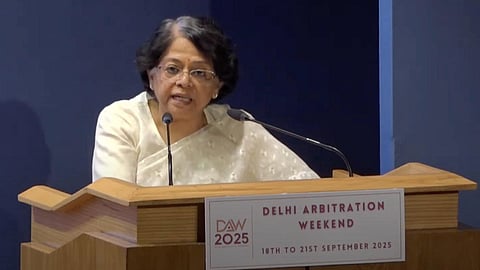
- Latest Legal News
- News
- Dealstreet
- Viewpoint
- Columns
- Interviews
- Law School
- Legal Jobs
- हिंदी
- ಕನ್ನಡ

Developing states are particularly vulnerable to foreign investors making huge claims under the Investor-State Dispute and Settlement (ISDS) mechanism, former Supreme Court judge Indu Malhotra said on Friday.
Speaking at the Delhi Arbitration Weekend 2025 (DAW 2025), Justice Malhotra highlighted that many times, claims are made on the purported ground of speculative future losses, indirect expropriation, or unfair treatment.
She underscored that the old-generation bilateral investment treaties (BITs) contain strong pro-foreign investor protections with no provision for safeguarding environmental or human rights issues.
“Developed states, interestingly, have taken steps to protect themselves from ISDS claims. States like Canada, the US, and members of the European Union are eliminating their exposure to ISDS claims but have preserved their ability for their investors to continue to extract wealth and exploit the Global South through continued use of ISDS claims. And that is why it’s a matter of serious concern,” she said.
Justice Malhotra was speaking at the DAW 2025 session titled Environmental Concerns in Investor-State Dispute Settlement.
She was joined by Mahesh Rai (Director, Dispute Resolution Deputy Head, Construction & Engineering, Drew & Napier), Aditya Singh (Partner, White & Case LLP), Sudhanshu Roy (India Legal Desk, Foley Hoag) and Ashwita Ambast (Legal Counsel, Permanent Court of Arbitration).
The discussion was hosted by the Permanent Court of Arbitration (PCA).
In her address, she highlighted that in the renegotiated trade agreement between Canada, the US and Mexico, which was entered into in 2020, the ISDS mechanism has been done away with. Justice Malhotra stressed that the way forward is to terminate these old generation treaties, but it is not easy.
“It has happened with respect to the Energy Charter, where a lot of states have been able to terminate these sunset clauses, and it’s also important that going forward there are incorporation of carve-out clauses which are incorporated in these treaties to address environmental issues and climatic concerns,” she stated.
The former judge criticised the ISDS mechanism for enabling claims that elevate corporate rights above sovereign authority. She described the burden on developing states as “debilitating,” citing the Tethyan Copper v. Pakistan case, where a $5.8 billion award exceeded Pakistan’s IMF loan.
Third-party funders exacerbate the imbalance by financing only investor claims, leaving states unable to meet protracted arbitration costs, she said.